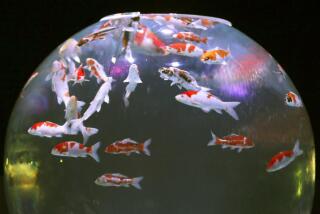Akihito’s Visit Carries Risks for China, Japan : Asia: Emperor’s trip to Beijing could bring diplomatic, economic gains. But there are touchy issues.
- Share via
BEIJING — An upcoming visit to China by Japan’s Emperor Akihito and Empress Michiko, formally announced today, is expected to bring major diplomatic and economic benefits to China--but at a risk to the governments in both Beijing and Tokyo.
“I think it’s a very risky visit on both sides, and in some ways I’m surprised the Japanese have acceded to it,” commented a Western diplomat, who spoke on condition of anonymity. Any kind of a Chinese “slight” to the emperor, even unintended, could have negative repercussions in Japan, he said.
On the other hand, if Akihito fails to make a strong enough apology for wartime aggression against China, many Chinese might feel that Japan still does not show sufficient recognition of the suffering it inflicted.
An announcement by the two governments today said the visit will take place from Oct. 23 to Oct. 28.
A decision will be made later as to the cities that Akihito and Michiko will visit. But Japanese diplomats said the couple would go to Beijing and Shanghai and would like to visit Xian, an ancient capital of China during a period of intense cultural exchange between the two nations.
The invitation was extended in the name of China’s president, Yang Shangkun, to commemorate the 20th anniversary of diplomatic ties between the two governments.
Coming after two millennia of exchange, the unprecedented visit by Akihito and Michiko is designed to focus on the future, not the past, a Japanese Foreign Ministry official said in Tokyo.
“They are not going to China to apologize,” added the official, who asked not to be named. The Beijing government, he said, “has said to us that . . . China has no intention of embarrassing Japan.”
The emperor, however, will make some kind of reference to the past, the Japanese diplomat said.
In Beijing, Zhou Jihua, director of the Japanese Politics Department at the Chinese Academy of Social Sciences, said the visit “surely will mark a new era in the promotion of relations between the two countries.” But Zhou added that he hopes the emperor “can make an expression with regard to the crimes committed by Japanese troops that can satisfy the Chinese people.”
“This can further improve the image of Japan among the Chinese people. . . . At a minimum, it shouldn’t be less than what was (said) 20 years ago (when) . . . Japan expressed ‘self-reflection over the great troubles’ caused during the war. I think what the emperor says cannot be less than this,” Zhou said.
Japanese Prime Minister Kiichi Miyazawa’s Cabinet approved the trip after more than eight months of debate within the ruling Liberal Democratic Party. Opponents argued against giving China the ultimate stamp of Japan’s approval at this time. China, which is moving to build up its navy, passed a law last spring reasserting claims to disputed islands south of Okinawa, which Japan calls the Senkakus and China calls the Diaoyutai. The same law also pressed what China calls its right to the Spratly Islands, which are claimed by several Southeast Asian nations.
Japanese concerns have been fanned by reports that China is interested in buying an aircraft carrier now under construction at Ukraine’s Nikolayev shipyard on the Black Sea.
Asked in a recent news conference if he thought Japan must strengthen its military to cope with a Chinese threat, Haruo Ueno, an adviser at Japan’s Defense Agency, cited what he called an emphasis by China on modernizing its naval power and declared: “We hope . . . that China’s armed forces will not exceed the limit of the defensive nature they have held until now.
“China is exporting weapons to the Third World and using these funds to modernize its defense industry,” Ueno added.
China, for its part, has expressed worry over the years about a possible resurgence of Japanese militarism, although concerns seem to have faded somewhat. Beijing now sees improved ties with Tokyo as a means to draw more Japanese investment and low-interest loans.
“There’s a Chinese proverb, ‘Two tigers in one forest will fight,’ ” commented Feng Zhaokui, deputy head of the Japanese Research Institute at the Chinese Academy of Social Sciences. “But the possibility of this now does not seem to be very great.”
Feng said he believes that growth in Japanese political influence in Asia is inevitable but that at least for the next 10 or 20 years it is likely to be expressed through the use of economic power rather than military strength.
China needs a “peaceful international environment” to develop its economy--a goal that is consuming “all its energy,” Feng said. China “won’t try to establish hegemony in Asia. This is unimaginable for China.”
Holley reported from Beijing and Jameson from Tokyo.
More to Read
Sign up for Essential California
The most important California stories and recommendations in your inbox every morning.
You may occasionally receive promotional content from the Los Angeles Times.













